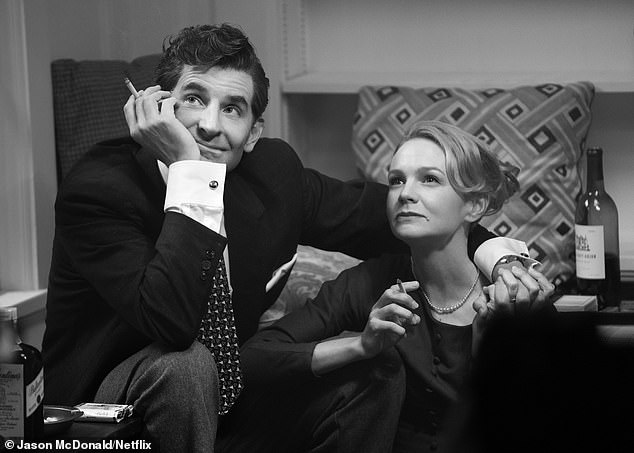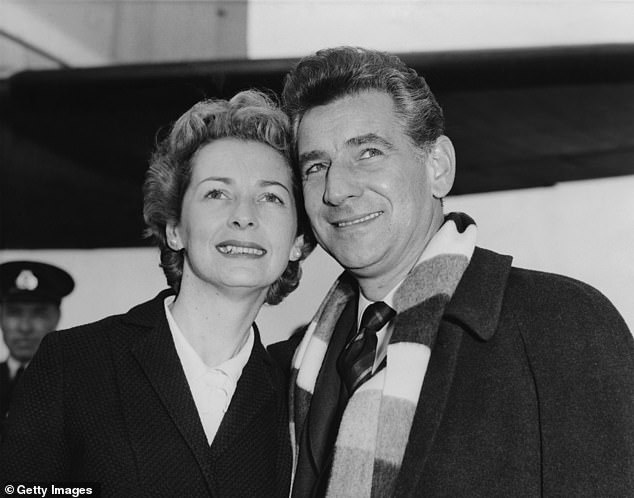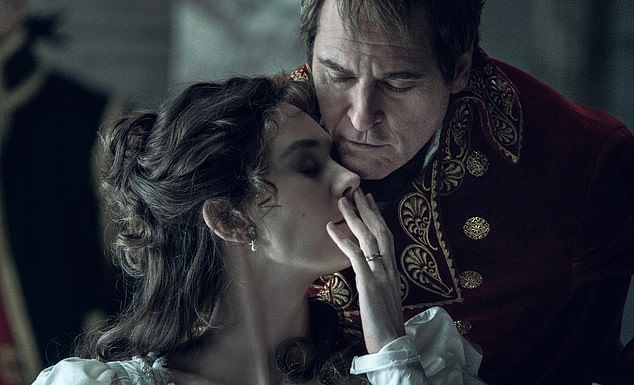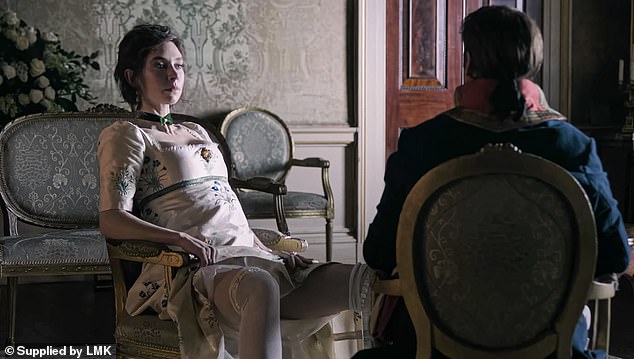Napoleon and Maestro reviewed: Bernstein v Bonaparte – Two biopics of great men (and their fraught marriages) go head to head – and it’s the composer who hits the high note, writes BRIAN VINER
Maestro (15, 129 minutes)
Verdict: Perfect biopic
HHI Napoleon (15, 158 min.)
Verdict: Not quite dynamite
A pair of wildly complicated marriages dominate two major biopics this week. Both films tell the stories of great men, one named Bernstein, the other Bonaparte, whose love lives, at least in these cinematic interpretations, drove and defined them almost as much as their genius.
Bradley Cooper’s Maestro is a stunningly intelligent drama that focuses on the complex relationship between powerful American composer Leonard Bernstein (fantastically played by Cooper) and his wife, Costa Rican-born actress Felicia Montealegre (an equally excellent performance by Carey Mulligan).
Many of these complexities arise from Bernstein’s bisexuality. When we first meet him in the 1940s, he has a male lover, and there is a small but meaningful pause when his sister (Sarah Silverman) discovers that Lenny and Felicia are in a romantic relationship. However, the film deliberately ignores the question of whether Felicia knows that her husband-to-be also sleeps with men, and when exactly she finds out.
By the time we jump to the 1960s and 1970s (from black and white to color) it has become a burning issue.
There’s a poignant scene in which Bernstein assures their daughter Jamie that there is no truth in the crude rumors she has heard, and an angry argument ensues between husband and wife in their large Manhattan apartment that has a darkly hilarious counterpoint, as a giant inflatable Snoopy along the window, part of the Macy’s street parade.
Bradley Cooper and Carey Mulligan in Maestro
All of this is so sharply written by Cooper and his co-writer Josh Singer (an Academy Award winner for 2015’s Spotlight) that there are moments when it feels almost brazen to watch, a public intrusion into private tumult. But it is clear throughout that their difficulties are underpinned by mutual devotion, which becomes movingly clear when Felicia is diagnosed with cancer.
It was bold of Cooper to let Bernstein’s exciting musical talent play second fiddle. But the film still chronicles his stellar career and explains how he was pulled in different directions, between his extraordinary talent for composing stage musicals (especially the incomparable West Side Story) and his equal ease with classical music. Not long before his death, I had the privilege of seeing Bernstein perform. It was an unforgettable spectacle to see an elderly man walk arthritically to the stage, slowly take over the baton and complete decades. It was as if he were holding a wizard’s wand the wrong way around, with all his magic moving into him.
Cooper captures this beautifully, both with his acting and his direction. His main achievement in this film, only the second he directed after 2018’s wonderful A Star Is Born, is conveying the booming charisma that had everyone around Bernstein dancing to his tune.

Bradley Cooper as Leonard Bernstein (director/writer/producer) and Carey Mulligan as Felicia Montealegre in Maestro

American composer Leonard Bernstein arrives at London Airport with his wife, actress Felicia Montealegre, on October 9, 1959
Moreover, Maestro does not deserve to be tarnished by the furore that erupted when it was first revealed that the (non-Jewish) Cooper was wearing prosthetics to mimic Bernstein’s nose. Bernstein’s kids gave their approval, which is good enough for me.
In a time of genuine, virulent anti-Semitism, we hardly need to mention this as an example.
There has been another fuss about Napoleon, Sir Ridley Scott’s epic story of the life of Napoleon Bonaparte. As I predicted in my First Look review last week, historians have raved about the inaccuracies and broad characterization of the title character, played enigmatically by Joaquin Phoenix. They have a point.
The film is wonderfully watchable, but also inherently flawed. Phoenix mumbles his way through it all, sometimes to the point of incoherence, and David Scarpa’s script doesn’t allow Napoleon to express himself much beyond the battlefield (where he’s a tactical genius) and the bedroom (where he’s a bit of a fool is). It is shown rather sketchily how he rose to emperor in post-revolutionary France and became as obsessed as any hereditary monarch with fathering a son to succeed him. But of his countless other achievements, all those innovations that gave rise to the adjective ‘Napoleonic’, there is nothing.

Joaquin Phoenix stars as Napoleon Bonaparte and Vanessa Kirby stars as Empress Josephine

Joaquin Phoenix and Vanessa Kirby in a scene from Napoleon
Yet at the age of 85, Scott remains a great storyteller, even if this is not quite the full story of Napoleon. Above all, the battle scenes are fantastic, starting with the victory that established the ambitious Corsican’s formidable military reputation: his surprise attack on the English to end the siege of Toulon in 1793.
There are plenty of good reasons to watch this movie. The music is wonderful (very moving, Edith Piaf accompanies Marie Antoinette to her execution), Rupert Everett is perfectly cast as the Duke of Wellington, and Vanessa Kirby is especially wonderful as the seductive Josephine. It’s easy enough to understand why Napoleon is in love from the moment he first sees her, although, again, one of history’s most celebrated love stories is largely reduced to his lust and her forbearance.
By the time this photo appears on the small screen, it will have gained weight. In due course, Apple TV+ will show the director’s cut, which is approximately four hours long. I’m rarely in favor of making films of such enormous length. But there’s no doubt that this Boney needs more meat.
Both films are now in theaters. Maestro can be seen on Netflix from December 20.
